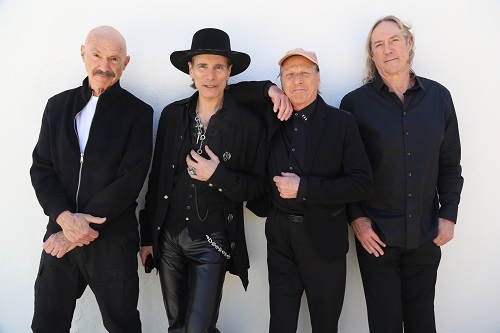By Shawn Perry
How many get the chance to revisit multiple past lives? When you’re a musical chameleon like Adrian Belew, there’s quite a few to poke at. In 2022, he began touring with Jerry Harrison of the Talking Heads, playing the group’s catalog, including the 1980 release Remain In Light on which Belew appeared. Then he joined up with the Celebrating David Bowie tour, reunited with the music he played when he toured and recorded with the Thin White Duke in the late 70s.
That barely covers a career that’s included over 20 solo albums, plus studio and stage time with the likes of Frank Zappa and Paul Simon. Further action on any of those fronts will have to wait because Adrian Belew is about to take a trip back to the most pivotal stage of his journey — when he was the singer, songwriter, and guitarist for King Crimson.
Along with Crimson bandmate, bassist Tony Levin, Belew is leading a tour with what’s being called “a creative reinterpretation” of the three iconic 80s King Crimson albums — Discipline, Beat, and Three Of A Perfect Pair. Joining Belew and Levin are renown guitarist Steve Vai and drummer Danny Carey, whose day job is maneuvering the pace for Tool. The union, dubbed BEAT, has already generated a tsunami of excitement, with a majority of their 65 scheduled concert dates for the Fall of 2024 quickly sold out. The first show is on September 12 in San Jose.
During a brief chat I had weeks before with Belew, headlong in the midst of more dates with Jerry Harrison, I gauged his thoughts on the sold-out BEAT shows. “I must admit it was an explosion I didn’t really expect,” he confessed. “Although I thought if you look at a pretty high-profile thing and you have the tools, audience, you have King Crimson fans, young and old…a lot of young people who never got to see it. I figured there would be an audience, a pretty-sizable audience, but I didn’t know they were that rabid. I also thought there’s probably some pent-up need for this, which is why I wanted to do it in the first place. But it really has taken everyone by surprise.”
Belew spent five years figuring out the right way to revisit his King Crimson legacy. He approached the band’s leader Robert Fripp in 2019 about ringing in the upcoming 40th anniversary of Discipline with a few shows. The ever-evasive Fripp, still touring with what presumably was the last-ever lineup of King Crimson, wasn’t interested in being part of it, though he was fine with Belew taking it further on his own.
“Robert first told me to go for it,” he recalled. “He didn’t think it was going to be a very serious thing. My thinking was — No, I’m going to put together a band, and do it the right way with a great crew and great production, management, the whole thing. So, when I went back to him and told him what I wanted to put together, I think he was absolutely shocked and very pleased about it. He said, ‘What are you going to call it?’ And I said, ‘We don’t know yet.’ He himself has used the name ‘Discipline’ for a lot of the business things, and we — meaning me, Tony, and Pat Mastelotto — have run a King Crimson band camp for 13 seasons and we’ve always called it ‘Three of a Perfect’ band camp. So, he (Fripp) said, ‘Why don’t you call this band BEAT? It’s the one that’s left.’”
Belew still wasn’t sure if he had the Crimson leader’s blessing and responded cautiously to the name suggestion: “I said to him, ‘Well, if we do that, are you going to be behind us?’ And he said, ‘Absolutely. I’ll be in the front row.’”

The relationship between Belew and Fripp, of course, has had its ups and downs. In the 1980s and 90s, during their most furtive years, the partnership was impermeable. After the double-trio version of Crimson in the mid-90s, Belew says they became “best friends,” doing a lot of writing together with Fripp staying at Belew’s house. “He was at my house for 120 days one year, so our relationship had by then fully blossomed into a deep friendship. He treated me unlike everyone else. I think he enjoyed me, enjoyed our family, being with us. He kind of opened himself up to be the real person that he is in instead of the facade that he presents to the public. He was always very encouraging of anything I wanted to do, especially as the songwriter. I think the friendship aspect of it — it’s one of those things it takes decades to develop.”
After the two restarted King Crimson in 2008 for a short tour, Fripp closed the band down once again, going so far as to announce his retirement from music. Then, out of the blue, he reconfigured the band in 2014, and brought in Jakko Jakszyk to replace Belew, who only learned about Crimson’s return on the Internet. He took the high road and assumed a rather nonchalant attitude about it, fully aware of the many shades and shadows in which Fripp operates.
With Crimson now permanently laid to rest and Fripp off making music with wife Toyah Willcox, the BEAT goes on. So how did the one and only Steve Vai, assuming Fripp’s role, get the gig? “I read an interview with him in which he said how influenced then he was by those three 80s Crimson records, and, in particular by Robert Fripp’s manner of playing,” Belew told me. “I remembered that Steve had said that, and he was our first call. I was really surprised because he was super excited by the idea. Later on, he told me, ‘I’ve been waiting for a challenge.’ At that point, we knew we had Steve on board, and we started thinking about the rest of the situation.”
With 80s Crimson drummer Bill Bruford uninterested in taking part, Belew said the choice of Carey was simple. “All along, I wanted Danny Carey because I’ve known Danny for years and of all the drummers I know, he probably knows more about that particular music than anyone. He actually said that music changed his whole life when he heard the Discipline record.”

Before proper rehearsals (at press-time, currently underway), Belew and Vai spent a day in Los Angeles, going over the material. Thereafter, Vai kept Belew up to date on his progress. “He sent me a video every day showing me what he’s doing and how it’s working out. He’s a very, very professional, high-level guy. Really is a nice person, too.”
Professional and nice help, though the one question twirling around in my head is how a refined shredder like Vai is going to adapt to the Frippian way? Is he playing the parts to scale, or is he changing it up and making it his own?
“He’s doing both,” Belew replied candidly. “I’ve gone through it with him. I’ve said, ‘Here’s things I think are essential that you have to cover in Robert’s way.’ Then I’ve said, ‘This is where I expect you to go be Steve Vai and invent your own things.’ He did get a new guitar synthesizer system, so he can make it more authentic sounding in certain places. Other than that, he will be doing Steve Vai, which is exactly what we want. Same with Danny.”
Belew seized the moment to clarify his goal and mission behind BEAT. “I want to see us be true to the records and the spirit of them, but I don’t want to see us be a cover band. That’d be silly. And I want to see us over time grow into this and take it our own way. We have 65 shows, five months. That’s a long time. You don’t want to play exactly the same everything every night when you’ve got those kind of people.”
In addition to playing the music from Discipline, Beat, and Three Of A Perfect Pair, Belew tells me they’re covering “Red,” the title track from a 1974 King Crimson album, which, of course, predates any of the BEAT members involvement. “There’s a reason for that,” he explained. “When we started in 1981, we didn’t have enough songs. We only had the songs we were writing. Robert agreed to in ‘Lark’s Tongue…’ and ‘Red.’ From that point on in the 80s band, we always played ‘Red.’ I consider it part of that period of King Crimson. Even though it’s the one composition none of us had anything to do with.”
As far as tackling any King Crimson music from the 90s or early 00s, Belew is quick to point out that the idea is to stay focused and “not to try to be everything.” Naturally, if the band delivers and demand increases, “the door is wide open.”
He quickly clarified: “I’m being real about it. We have 65 shows, and everyone’s very busy. We will, if we can, carve out over periods of time together. I think everyone wants to do that, but there’s no telling how that will transpire and when it will happen.”
And BEAT may have a future beyond 2024.
“We have hinted with each other that if it went long enough, we’d probably start writing things of our own,” Belew confided. “You got to take it in steps. The first step is what we’re doing now. The second step would be to take this as many other places as we could. You’ve got all of Asia, South America, and all of Europe, Australia, so forth. I think if we’re super lucky, we would get to do all of that.
“That would be my dream.”

![]()








